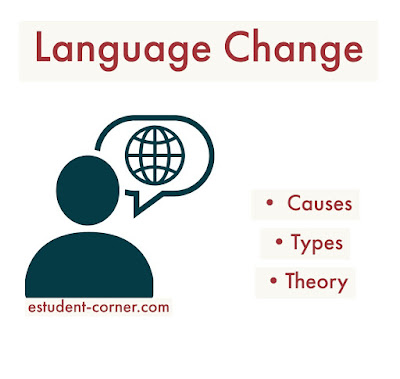- What is Language Change ?
- Theory of language change
- What are the causes of Language change?
- Types of language change
(ii) Grammatical change and lexical change,
(iii) Semantic change.
- Causes of sound change
- Types of sound change
(ii) Conditioned or combinatory change s,
(iii) Sporadic change .
- Factors of Lexical change
(i) Loss of lexical items ,
(ii) Change of meaning
(iii) Creation of new lexical items
(ii) Historical causes ,
(iii) Environmental causes ,
(iv) Psychological cause .
(ii) Change of meaning
(iii) Creation of new lexical items
- Causes of semantic change
(ii) Historical causes ,
(iii) Environmental causes ,
(iv) Psychological cause .
SOUND CHANGE AND LANGUAGE CHANGE
Language has a tendency of change from complexity towards simplicity, from length toward precision , from difficulty towards ease , from disorder towards order , . Need for uniformity or diversity , desire for novelty , need for new expressions because of new inventions , discoveries , development and need to find words for new objects , concepts , and places cause language change .
Language change because of linguistic , social , cultural , psychological , historical and geographical factors too . According to Saussure's , language changes due to the innovation of individual and of community , and historical reasons . Hold Croft gives several account of linguistic change and concludes that sound change arises from the preference for one non-distinctive variant of a phoneme over another . Changes in the syntax or phonology or meaning of a language also resent from borrowing, which in most cases takes place because of 'prestige' . Neighbouring dialects and languages as well as foreign languages also brings about linguistics change .
Read Language and its Basics features
Read Language and its Basics features
Types of Language change
Q.1 What is external And Internal language change? With example
Language change may be very broadly divided into two categories - external and internal change.
Borrowing is all its forms are instances of external change , changes that do not come about through borrowing , may be called instances of internal changes.
Some forms of internal changes are addition and loss of sounds and lexical items . In order to have a judicious and comprehensive account if language change .it would be better to deal with it level wise .
In that case , language change may be studied under the following heads :
Borrowing is all its forms are instances of external change , changes that do not come about through borrowing , may be called instances of internal changes.
Some forms of internal changes are addition and loss of sounds and lexical items . In order to have a judicious and comprehensive account if language change .it would be better to deal with it level wise .
In that case , language change may be studied under the following heads :
(A) Sound Change ,
(B) Grammatical and lexical change ,
(C) Semantic change
Sound change is a term employed to describe the passage , or historical transition, from a given phoneme or groups of phonemes to another for example - The change of Germanic Sk into old English sh. In other words , sound change may be defined as the creation or disappearance of phoneme . A Sound change can be said to have occurred , when the pronunciation by a social unit (town , village , or nation) of that sound at a time is different from what it was at an earlier time .
SHORT NOTES ON
SYNCHRONIC AND DIACHRONIC APPROACHES
SHORT NOTES ON
SYNCHRONIC AND DIACHRONIC APPROACHES
Causes of sound change
Sound change is brought about by anatomical changes within the population. Others assign sound change to social , historical reasons and discover a link between political instability and linguistics instability.
According to Ease theory , sound changes occur because of human laziness ,indolence ,inertia , shirking , sluggishness or whatever other beautiful synonym may have been invented for "economy of effort" or "following the line of least resistance". The imitation theory finds the origin of phonetic change , as indeed any other linguistics change , in imitation whether conscious or unconscious,of the speech habits of the other people . Lastly , the most potent and widespread cause of sound change is the speech interference in the bilingual speaker .
Types of Sound change
The following is only a rough and broad division of sound change . There are always borderline cases which do not fit in any scheme . Most changes can , however, be placed in one of the three categories.
(i) Unconditional or Generic Changes ,
(ii) Conditional or combinatory changes ,
(iii) Sporadic Or miscellaneous changes .
(i) Generic and Combinatory changes :
A generic or unconditional change is a change that affects every occurrence of a certain sound , no matter where in that worry it occurs .
For e:g , Old English |ɑ:| (long a) changes everywhere to middle English |o:| and later to |ou| .
The word ham/ ha:m / for example, became hoom / hu:m/ and latter home/houm/ , similarly , the word ban/ ba:n/ became boon /bu:n / , and later bone/boun/.
(ii) Unconditional or Generic changes are rare conditional or combinatory changes are which occur only under a fixed set of conditions; "Allophones of phonemes are generally restricted to certain environment here they are conditioned by their surroundings. When such Allophones undergo a change , we speak of a conditional or a Combinatory change .
For example , In middle English, the first syllable of any three-syllable word was shortened , so Halidaeg eventually became holiday.
(iii) Sporadic change :
It is not easy to draw the line between conditional change and Sporadic change , since the two merge into one another, so we treat the word Sporadic very loosely to mean a change of phoneme that does not occur elsewhere and also to include morphemic changes .
(B) Lexical and Grammatical change
Grammatical and Lexical change in grammar and vocabulary. It is often regarded as totally different from sound change . Yet it is motivated by the same driving force The need to maintain and simplify the patterns of language ,in order to lighten the burden on memory . By Grammatical change the member of Grammatical set are increased or reduced in numbers and the means involved in making Grammatical categories are extended . Since such changes are carried out in accordance with pattern which already exists in the language , they are referred to as analogical . The process itself is called analogy .
Lexical (Vocabulary) change
In reality there is no rigid dividing line between grammatical change and vocabulary change . Many a time the two intersect . The vocabulary of a language is more strictly called it's Lexi's , and it is lexical items which are examined . It is sometimes convenient to subdivide Lexical change into three factors .
(a) Loss of lexical items ,
(b) Change of meaning ,
(c) Creation of new lexical items
(a) Loss of Lexical items
Word loss is due to the internal and external factors Homonymic clash phonetic attrition and the need to shorten common words are common external causes . Homonyms are words which have the same phonemic structure but different meaning,as with bank 'land along each side of a river or canal'.Flat-Topped mass of clouds , snow etc , one formed by the wind ".
(The sun went down behind a bank of clouds . Establishment for keeping money and valuables safety 'row of keys' a three bank typewriter , I'm banking on your help. The existence of homonyms need to lead to word loss it only does so if the homonymic clash between English letter . It is out of these homonyms that the English word let was developed . As there were numerous contexts when the two could become confused , the second .
Sometimes alternative Lexical items are in use depending on region or social class , as with pairs such as table , napkins and serenity , radio and wireless, if one of the pairs becomes more socially acceptance , the others are likely to drop out of use . In Indian English , for example, the word Madam is more in use than mistress . An interesting type of social cause is Lexical loss through taboo . For example - passing away is favoured more than dying. American attempts to avoid the word lavatory have led to a list of substitute such as comfort , station , powder room , little girls room .
(C) Semantic change
Diachronic Semantic studies Semantic change , whereas Synchronic Semantic accounts for Semantic relationship, simple or multiple. According to referential theory , a Semantic change will occur whenever a new name becomes attached to a sense and or a new sense to a name '.
The main factors responsible for Semantic change are vagueness in meanings , loss of motivation, polysemy , ambiguous contexts and the structure of the vocabulary.
Causes of Semantic change
Changes of meaning can be brought about by an infinite multiplicity of causes , only major causes are discussed below -
(i) Linguistics causes ,
(ii) Historical causes ,
(iii) Environmental causes ,
(iv) Psychological causes .

.png)






it really helps me for making my ppt thank you very much
ReplyDelete